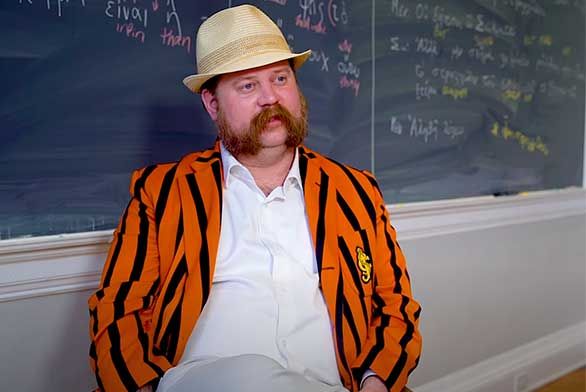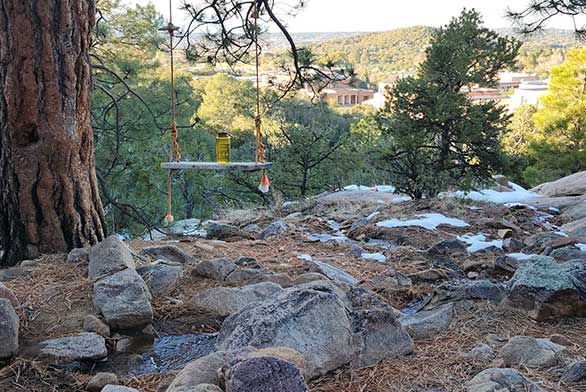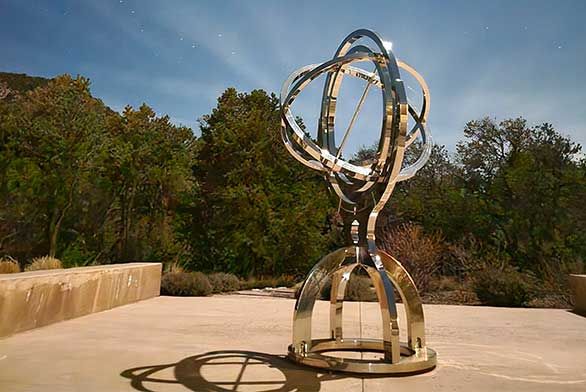From East to West: Micah Beck (A09, EC2026) Embraces Global Classical Traditions in Annapolis and Santa Fe
January 30, 2025 | By Jacob Sharpe (A27)
When Micah Beck (A09, EC2026) came to Annapolis as a first-year Johnnie, he was determined to squeeze as much as he could out of his undergraduate years. He hit the ground running as a pioneering freshman to play in the college’s annual croquet match against the Naval Academy. However, Beck was disappointed with the attitudes of many of his Annapolis Johnnie peers, who seemed to engage in a silent competition with one another to remain on only one campus for all four years. Beck recalls finding this phenomenon “strange, somewhat funny, and mostly unfortunate,” and he was determined to never play a part in it.

Beck spent his sophomore year at St. John’s Santa Fe until croquet called him back east junior year; he went on to serve as the team’s Imperial Wicket as a senior. But Beck’s experiences in Santa Fe and Annapolis had transformed him, leading him to vehemently disagree with lingering stereotypes affixed to both campuses. Santa Fe and Annapolis are siblings, not competitors. The best way for any Johnnie to realize this, Beck concluded, is simply to spend one year at the other.
A single year of study in Santa Fe wasn’t enough for Beck, who, nearly 20 years after arriving at St. John’s Annapolis, returned West to experience St. John’s Master of Arts in Eastern Classics (often simply referred to as the “Eastern Classics,” or the “EC” for short). Now two semesters into the program, Beck finds himself exercising familiar Johnnie concepts while learning new ones—a process he considers to be a natural continuation of his undergraduate education.
The Eastern Classics program takes students east of the Aegean to texts of South and East Asia, from Confucius’s Analects to the Rigveda, the canonical collection of Vedic Sanskrit hymns. Lingual study continues eastwards as well, with participating students taking Sanskrit or classical Chinese. Beck is enrolled in Sanskrit, but he is excited to study classical Chinese as well during the 2025-26 academic year—a unique opportunity afforded him due to his student-work position with the campus’s Public Safety office, which allowed him to extend his EC degree past its typical three consecutive semesters.

Students encounter vast ideological differences in the EC in texts that predate contact between East and West. Despite these differences between the two canons, Beck notes commonalities. He likes the works of Confucius in particular, whose persona he finds like that of Socrates: “He leveled me with his sense of wonder, his sense of wanting to continue to learn, his sense of joy, and love of music,” Beck says. Both Plato’s Republic and Confucius’s Analects search for the meaning of justice and conclude that the place to find justice in the individual is in the justice in their city. Even so, the philosophers hold unique perspectives on good government, diverging on the matter of whether the “noble lie” or the implementation of rites provides the best foundation for a state.
“China has been very like Greece: very ‘ordering of the self’ and ‘ordering of the soul’ and ‘ordering of the people,’” Beck says. “Confucius and Socrates and company were talking to one another, whether they knew it or not.”
Beck’s experience with Sanskrit has also been a smooth one, which he credits to his background in ancient Greek. Sanskrit directly compares to Greek, he says, as the two share nearly the same number of grammatical cases—Greek lacks the ablative—with the additional challenge of several dozen more letters and ligatures. (For all intents and purposes, Sanskrit does have several hundred letters, which students must reckon with early on as they translate sections from the Gita.) And while learning ancient Greek, students have an unconscious knowledge of many words’ meanings due to cognates and shared idioms with English, such as “democracy” and “Achilles’ heel.” Sanskrit offers similar assistance with cognates, albeit with less frequency, such as “mother,” “father,” and “brother.”

In short, Beck finds similarities every time he’s presented with an East vs. West dichotomy, whether he’s reading the Eastern Classics years after grappling with the Western ones or discussing St. John’s Santa Fe in relation to St. John’s Annapolis. And it’s not hard to find them ourselves—at least when it comes to St. John’s two campuses. For example, Santa Feans and Annapolitans perform a communal Palestrina sing-along every Wednesday with Sicut Cervus. Last fall, Santa Fe’s Chrysostomos and Annapolis’ King William Players independently decided to perform Tom Stoppard’s Arcadia. Annapolis’s long-popular swing dancing is now popular in Santa Fe, while Santa Fe’s Graduate Institute eventually expanded to Annapolis. And above all, St. John’s College constantly reminds us of the universality of people in their quest for truth, be they a thinker in Santa Fe, Athens, Chang’an, or Annapolis.
Bachelor’s degree recipients from St. John’s College looking to enroll in the Master of Arts in Eastern Classics are eligible to complete an expedited application and automatically receive a 25 percent tuition discount. Learn more: https://www.sjc.edu/academic-programs/graduate/partnership-programs

